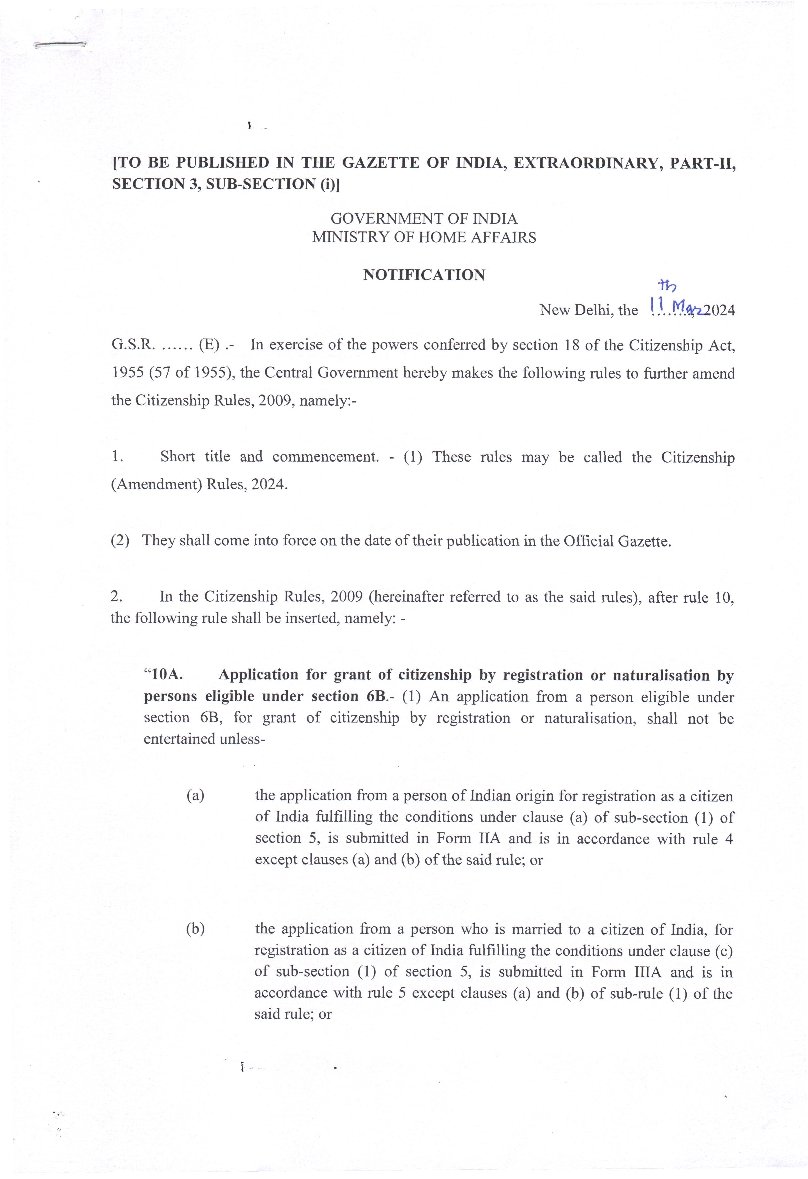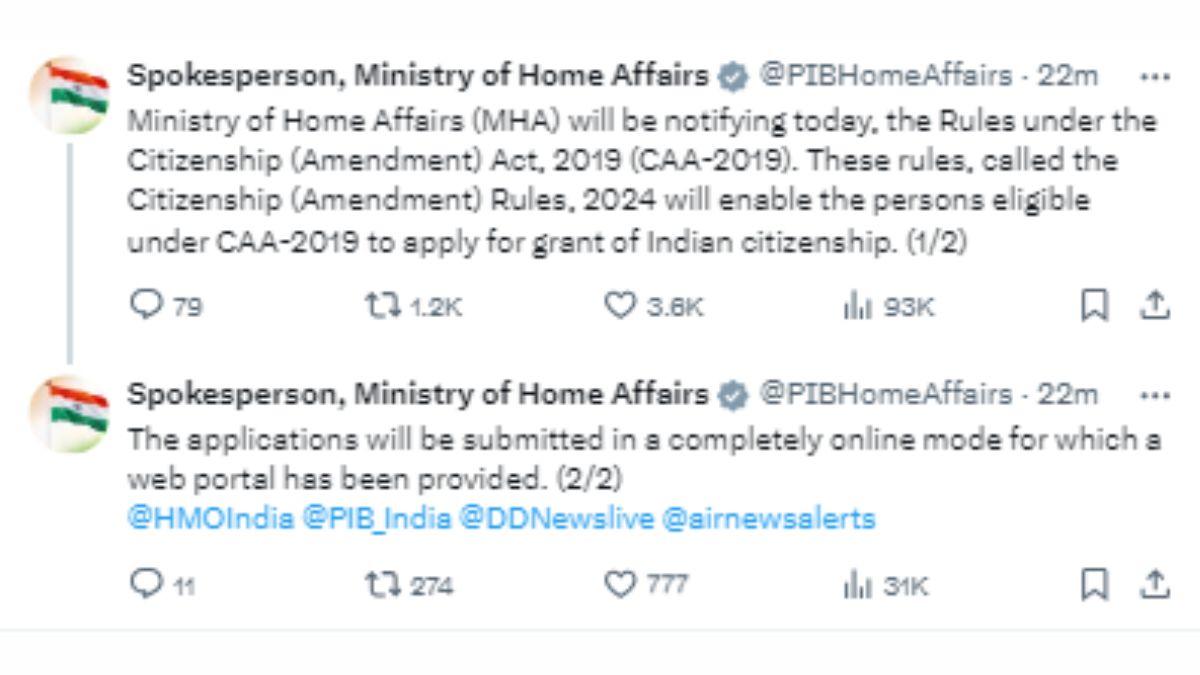CAA (Citizenship Amendment) implemented in India as the Indian government announced it on March 11 that it would officially implement rules under the CAA on March 28, just weeks before crucial general elections to be held either in April or May.
This controversial law expedites granting Indian citizenship to non-Muslim minorities facing religious persecution from neighboring Pakistan, Bangladesh and Afghanistan.
Though passed in 2019, the CAA had faced years of protests and legal challenges, delaying its implementation. But with the government finally notifying the citizenship rules, political debates have reignited over fears the pre-poll move could cause unrest in some regions.

The CAA’s Journey
Introduced as the Citizenship Amendment Bill in 2019, the CAA sought to grant Indian citizenship to undocumented Hindu, Sikh, Buddhist, Jain, Parsi and Christian migrants who entered India on or before December 31, 2014 after facing religious persecution in the Muslim-majority nations of Pakistan, Bangladesh and Afghanistan.
The bill was swiftly passed in both houses of Parliament that December, then signed into law by the President – a move celebrated by the BJP which had pledged this legislation in its 2019 election manifesto.
However, the CAA faced immediate and widespread backlash, with critics denouncing it as blatantly discriminatory and unconstitutional for excluding Muslim migrants from its purview.
Protest demonstrations erupted nationwide, most notably at New Delhi’s Shaheen Bagh where a months-long sit-in by Muslim women grabbed global headlines.
Political tensions soared, with opposition parties accusing the BJP of undermining India’s secular foundations.
With the COVID-19 pandemic hitting India soon after, the contentious law was sidelined as the nation battled the healthcare crisis and economic disruptions.

Now, ahead of national elections where the BJP aims for an unprecedented third consecutive term, the new rules have resurfaced the CAA as a burning political issue.
A Pathway Toward Indian Citizenship
As per the freshly notified rules, the CAA enables certain undocumented migrants facing religious persecution in Pakistan, Bangladesh or Afghanistan to acquire Indian citizenship more swiftly. Key criteria include:
- Eligibility is limited to Hindus, Sikhs, Buddhists, Jains, Parsis and Christians from the three nations
- Migrants must have entered India on or before December 31, 2014
- Applicants must have resided in India for 5 of the preceding 14 years, or the immediately preceding 12 months
- The normal 11-year residence requirement for naturalization has been reduced to just 5 years under CAA

To streamline the process, the Home Ministry has launched a dedicated online portal and mobile app called “CAA-2019” for applicants to submit documents like passports and residential proof. An Empowered Committee will scrutinize applications while district authorities verify residential status claims.
A Gamechanger for Some, Existential Fears for Others
The new citizenship pathway holds profound significance for marginalized groups who bore the brunt of religious oppression in Muslim-majority nations.
Among those jubilant are members of West Bengal’s Matua community, who migrated from Bangladesh in prior decades facing faith-based persecution. With citizenship hopes finally crystallizing, Matuas could emerge as an influential vote bank in this poll-bound state.
However, the CAA’s implementation has also reignited fierce opposition in Assam and other northeastern states with fragile ethnic dynamics.
Indigenous groups have protested vigorously, fearing the law will irreversibly alter the region’s demographic makeup by facilitating an influx of migrants granted fast-track citizenship. Assam witnessed widespread unrest after the CAA’s original passage.
On Monday, protest marches and strikes erupted across Assam as indigenous student unions publicly burned copies of the citizenship law. “Our democratic movement against the CAA will go on…we won’t accept this act at any cost,” warned Samujjal Bhattacharjya, advisor to the powerful All Assam Students’ Union.
Officials have urged restraint and deployed additional security forces in sensitive areas.
While the ruling BJP defends the CAA as upholding India’s moral obligation to shelter persecuted minorities from neighboring nations, critics view the legislation’s recent implementation as a brazenly opportunistic ploy to consolidate Hindu votes ahead of elections.
Opposition leaders have lambasted the BJP over the CAA rules’ timing, accusing the party of indulging in publicity stunts and deviating from core economic issues plaguing the nation. Delhi Chief Minister Arvind Kejriwal alleged the move went “against the country” and predicted voters would respond at the ballot box.

Within the BJP’s ranks, however, the mood is triumphant. “No one can stop implementation of the CAA as it is the law of the land,” declared Home Minister Amit Shah last December, vowing to offer refuge to persecuted people globally. As a core Hindutva agenda, the CAA’s rollout fortifies the BJP’s credentials among its ideological support base.
Ahead of polling beginning next month, the nation braces itself for further fractious debates and potential unrest as competing narratives over the CAA take center stage. While advocates celebrate the new path to citizenship, opponents decry it as an assault on India’s pluralistic ethos. The coming weeks will be a crucial test for the world’s largest democracy.
Also Read: Arun Goel’s Shocking Resignation as Election Commissioner, here.












Comments 1